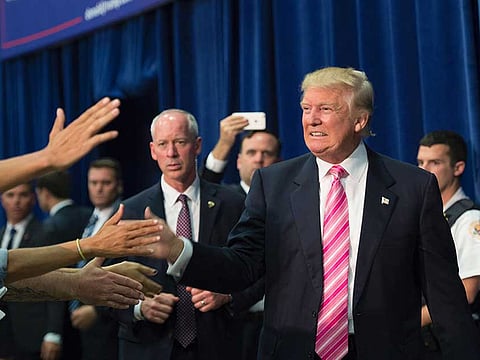Vulgar type of populism won in US
Since the early 1990s, there has been a rapid erosion of honest statesmen at the national and international levels. Trump’s victory being a clear case in point

What is really going on? US President-elect Donald Trump has insulted women during his campaign through vulgarity and using derogatory words as we found out during his campaign. Then there was the short clip showing him embracing three girls in bikinis. A few weeks ago, social media was distributing short clips showing him beating another person in a wrestling hall.
Yet Trump won the elections to become the 45th president of the United States. Does he have a programme or a vision beyond his provocative statements? If statements can abbreviate a programme, then Trump will have some unusual measures and procedures, but not a vision.
This may be a euphemism for actions that could be characterised as racist and discriminatory. But it is obvious that a large segment of Americans no longer care about programmes or visions when it comes to choosing their president.
What about the political elite itself? Is this elite still obliged to judge those who run for the presidency based on strategic visions or intellectual concepts? It doesn’t seem so, at best such an ‘obligation/interest’ is less than what it was before. The division within the elite seems obvious when more than half of the Electoral College voted in favour of Trump, leaving only one conclusion: A distorted vulgar edition of populism has won.
Trump’s victory represents a peek into a long road to deterioration in America and the world as a whole. Commenting on Trump’s win, Noam Chomsky — in an interview with DPA published last Wednesday — described Trump as “an outcome of a decrepit society heading strongly towards collapse”.
Growing tendencies of hostility
The deterioration path began in the early 1990s, shortly after the collapse of the former Soviet Union and with the awakening of nationalism that had resulted in wars in the Caucasus and the Balkans, alongside the growing tendencies of hostility against immigrants in Western European countries — all of which had an impact the following years until the present day.
The resurgence of identities in a dangerous dimension may seem closely related to the deterioration of economic conditions, but the embodiment of these trends seems beyond the impact of the economies themselves.
Explaining the rise of the extreme Right, Bahraini economist Dr Mohammad Al Saeed said that there is a growing tendency among the extreme right-wing to exercise a punitive type of voting, which is noticeable among a marginalised working class and those affected by the harsh economic measures followed by European governments. In a paper for a panel discussion on the rise of the extreme-right, organised by the Dubai Public Policy Center last October, Saeed believes that this progress of populist parties, whether from the Right or Left in Europe, does not threaten the traditional right-wing of the ruling elites in Europe that monopolised executive, legislative and judicial authorities and the media and the parties’ strongholds.
He concluded that the countries that have so far failed to overcome the cycle of the global financial crisis of 2008, such as France and Italy, are the most “vulnerable” on the political tide of radical delinquency — whether to the Right or Left.(Read:www.bhuth.ae/download/the-new-ascent-of-far-right-in-the-west-it-s-the-economy-again-again).
Exception to logic
But Trump’s victory either calls for a re-check on the extent to which the economy affects voters’ choices or demands an understanding of whether Trump is an exception to logic.
According to Chomsky, Trump is “a unique event unparalleled in the civilised West”. This reveals the level of deterioration of values and lack of visionary statesmen among the American political elite.
Since the early 1990s, there has been a steady deterioration of values and ideals and a rapid erosion of honest statesmen at the national and international levels.
There are no more great ideas and visions to promote and attract voters and citizens in general. Politics is drained and economists are also not able to come out with any creative thoughts that can usher in economic prosperity and social justice.
Political elites no longer have great leaders with visions, but politicians of the worst kinds: Representatives of global companies and firms, arms dealers or leaders of nationalist and sectarian narrow-minded and utterly banal parties, who only know how to plunder and establish corruption networks. But unfortunately, these types of leaders get re-elected through the ballot boxes in periodic elections by voters who are obsessed with primitive concerns based on fear and imaginary enemies.
Mohammad Fadhel is a Bahraini writer and Media consultant at “b’huth” (Dubai).
Sign up for the Daily Briefing
Get the latest news and updates straight to your inbox


